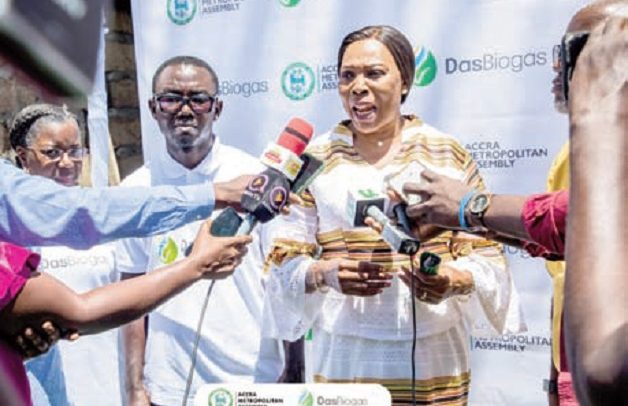Elizabeth Kwatsoe Sackey speaking with the media
The Accra Metropolitan Assembly (AMA) has commissioned a newly installed onsite biogas plant with a capacity to process 180 tonnes of organic waste daily at the City Hall.
The plant, developed by DasBiogas and Construction Limited, is designed to convert organic waste from the AMA’s canteen into biogas for cooking and to produce organic fertiliser.
Speaking at the commissioning, the Mayor of Accra, Elizabeth Kwatsoe Sackey, described the biogas plant as a “game-changing and innovative technology” that aligns with the Assembly’s Climate Action Plan for 2020-2025.
“This plant marks a significant milestone in the management of solid waste, not only in Accra but beyond,” she said.
Mayor Sackey noted that with the over 1,200 metric tonnes of waste generated in Accra daily, the biogas plant would play a critical role in reducing the volume of waste sent to landfills while producing clean energy, adding that plans were far advanced to construct a larger plant at Kaneshie to meet the growing demand for clean energy through compressed natural gas.
According to her, the plant would significantly contribute to mitigating harmful gas emissions while addressing the city’s waste management challenges, adding that the collaboration with DasBiogas and Construction Limited was a testament to the AMA’s commitment to finding sustainable solutions to Accra’s waste and energy needs.
Chief Executive Officer (CEO) of DasBiogas and Construction Ltd, Enoch Kofi Boadu, expressed excitement about the project, highlighting the company’s journey since 2016 to develop a solution that transforms waste into clean energy.
He noted that the DasBiogas Portable Prefab Biogas Plant, launched in 2022, represents a breakthrough in waste management and energy access.
“At DasBiogas, our vision is to offer every household and business the opportunity to turn organic waste into clean, affordable energy,” Mr. Boadu said.
He explained that the plant was an adaptable and sustainable solution that could be integrated into various settings, including homes, schools, hotels, and businesses, to create cleaner cities.
Mr. Boadu also called for government support and policies to scale the biogas technology across Ghana, emphasising its potential to reduce reliance on Liquefied Petroleum Gas (LPG) imports as well as divert significant amounts of waste from landfills.
In a statement read on behalf of the Energy Minister, Herbert Krapa, he lauded the project as a step toward achieving Ghana’s renewable energy goals.
He noted that the biogas system addresses three critical issues: waste management, energy security, and environmental sustainability.
“This innovation aligns perfectly with the ministry’s strategy to promote waste-to-energy technologies, contributing to Ghana’s efforts to reduce carbon emissions and achieve a circular economy,” he said.
The minister also expressed commitment to supporting private sector initiatives like the DasBiogas plant, stressing the role of public-private partnerships in advancing Ghana’s renewable energy transition.
A Daily Guide Report


